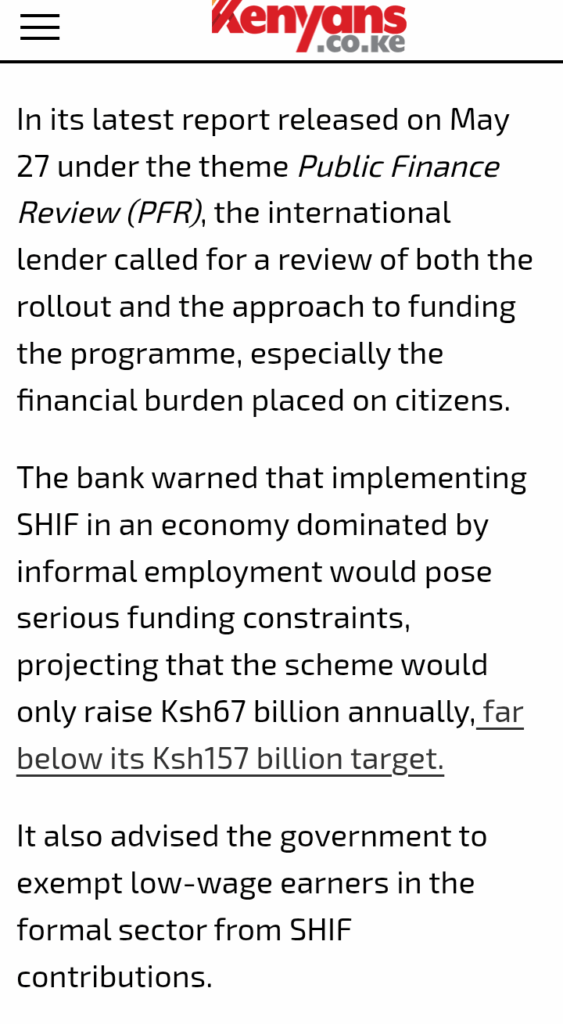The World Bank has called on the Kenyan government to rethink its approach to implementing President William Ruto’s Universal Health Coverage (UHC) plan, which introduced the Social Health Insurance Fund (SHIF), this is according to a report shared by Kenyans.co.ke.
This comes as many Kenyans continue to express concern about how the new health plan is being rolled out and the costs involved.In its latest report released on May 27 under the Public Finance Review, the World Bank raised several red flags.
It wants the government to review not just the rollout of the SHIF programme but also how it is funded. The Bank noted that SHIF puts too much financial pressure on ordinary citizens, especially in a country like Kenya, where most people work in the informal sector.

It warned that the expected income from SHIF would be only Ksh67 billion per year, far below the needed Ksh157 billion. This shortfall could cripple the programme if not addressed.
The World Bank also recommended that low-paid workers in the formal sector should be excluded from making SHIF contributions. It argued that such a move would reduce unfairness in the labour market and make formal employment more attractive.
To cover the gap, the government was urged to finance SHIF for the poor, informal sector workers, and low-earning formal workers using money from the national budget.
This would help ensure everyone gets healthcare without being overburdened.In addition to fixing the SHIF funding issues, the World Bank asked the government to fully fund two key health programmes, the Primary Health Care Fund and the Emergency, Chronic and Critical Illness Fund. These are important in making sure ordinary Kenyans can access treatment when they need it most.
With some donors, especially the US government and Gavi, now pulling out or reducing support, the Bank wants the government to step in and cover the shortfalls in programmes like immunisation and other critical services.
The report also pushed for the government to collect SHIF contributions mainly from formal sector workers, while subsidising informal workers and vulnerable groups directly. This, according to the World Bank, would promote fairness and ensure equal access to healthcare for all.It also stressed the importance of fixing weaknesses in the health system.
That includes hiring more health workers, making sure health facilities have enough drugs and equipment, and improving services in regions that are often neglected. Vulnerable groups should not continue suffering because of poor planning or lack of resources.
To make the system more efficient, the World Bank called for better governance. It recommended that national and county governments work more closely, that hospitals be given more control over their finances, and that medical supplies be bought through a single system like KEMSA to save costs.
The SHIF benefits package also needs to be realistic and fit within the funds available. Beyond health, the report gave a sobering picture of Kenya’s economy.
Public debt is now a major worry. Nearly one-third of all tax revenue goes toward paying interest on debt. Although there have been some improvements in economic indicators, Kenya is still struggling because of weak revenue collection, slow economic growth, and rising domestic borrowing.
The World Bank said the country’s debt now stands at 68 percent of GDP as of 2024, which puts it at high risk of distress. The government must act fast to avoid a full-blown crisis.


